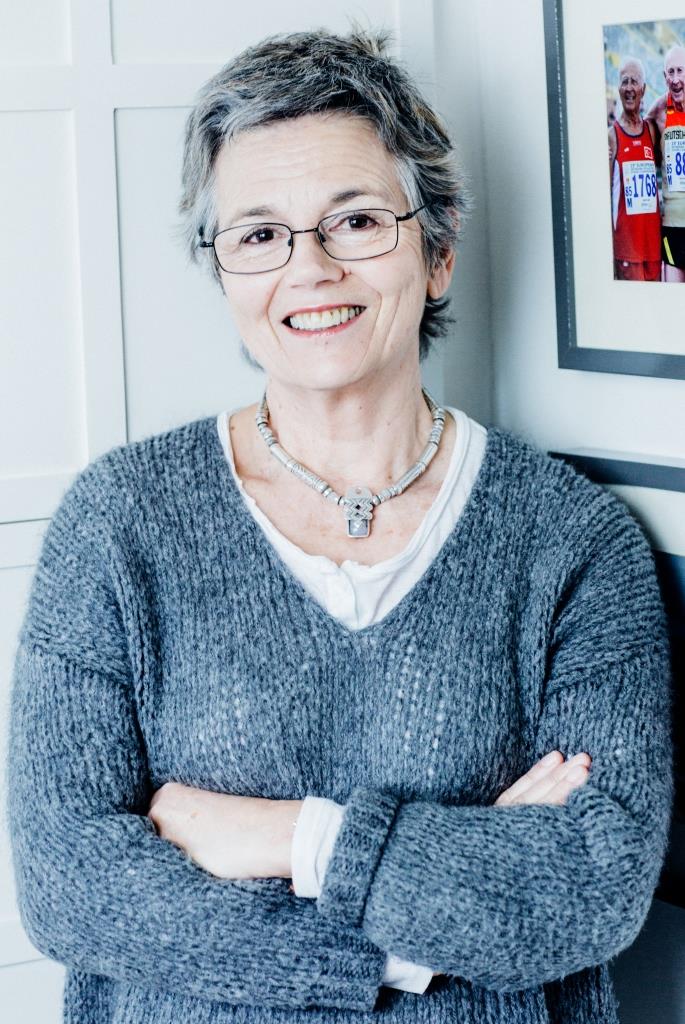Real ambition: the secret of my success as a photographer
To celebrate the launch of our new book, Real Ambition, we speak to six inspirational women about what success means to them. Read more in our October issue, out now

Alex Rotas is a photographer who documents elite sportsmen and women who still compete in national and international competitions through their 60s to 90s.
Through her photographs, Alex is challenging the negative narratives around ageing. Meet some of the inspirational athletes that have caught her eye in the gallery entitled: changing perceptions of ageing.

1. Describe your job in three words:
Photographing older sportspeople.
2. What were three things you did that led you to getting the job that you love?
Step one was having a goal. I was looking for images of older sportsmen and women and couldn’t find any. That’s when I thought: ‘Wow, here’s something that needs to be put right. I’ll have a go myself at taking some pictures and getting them out so the world knows about these people.’
Step two was learning how to take photographs, (I didn’t even have a camera), and finding out about the kinds of events that would provide me with the photographic opportunities I wanted.
Step three was just doing it! Throwing caution to the wind and having a go with no sense of outcome. I decided to treat it as an adventure where the journey would, to borrow an overused cliché, be as important as the destination. I didn’t know what sorts of photos I’d get or who I’d meet, or even what I’d do with the pictures afterwards. I just got stuck into the process and put worrying about whether or not anyone would be interested in what I was doing on hold.
I’ve always been a planner and this really was a bold new step for me – just to let go and let it happen and see where it took me.
3. What is your biggest belief about how to be successful in life?
Primarily it’s about defining ‘success’ in our own terms and letting go of some of the more prevalent external definitions such as wealth and fame, or indeed our families’ definitions of success and their expectations of us. It’s actually taken me a lifetime to get to this point. Embedded in this is learning to listen to our own inner voice, learning that we have an inner voice, and that it’s worthy of our respect, love and attention.
My experience is that if and when we can learn to live authentic lives, we feel a profound sense of joy and peace, irrespective of external outcomes. To me, that’s success. I don’t think it’s a secret, nor is it particularly original, but I’m very happy to be getting there, finally.
4. What’s the secret of your success?
I don’t know what success I can claim in external terms but for me it’s learning how to be happy. In particular, it’s been about giving up on so many of the strictures that held me in my earlier years, especially my need to grip the metaphorical steering wheel of my life with clenched knuckles. I grew up thinking you had to be a great planner and controller so I was someone who was constantly surprised when things turned out to be so very different to how I’d envisaged them.
Finally, when I turned 60, I gave up at my attempts to control my life and to my astonishment, relinquishing any attempts to steer things meant I was led to unexpected and delightful places that I couldn’t possibly have anticipated. I found I was enjoying the ride more than I could ever have imagined. I don’t know if everyone calls that success, but for me, honestly, it really was and is.
5. What’s the biggest career mistake you made along the way and how did you rectify it?
I took on a post once that I thought would please my parents. I was in my 40s. I absolutely hated it. Finally, closer to 50 than 40, I chucked it in. My parents’ opinion of me mattered, I’m afraid to say, and I wasn’t looking forward to telling them. When I did, I discovered they couldn’t have cared less, either one of them!
6. What’s the one thing about doing your job that surprised you the most?
Photographing elite sportsmen and women in their 60s, 70s, 80s and 90s has been an eye-opener for me in many ways. Maybe top of the list is the realisation that these people don’t avoid the heart conditions, strokes, knee/hip replacements, etc of their peers. They just carry on. They adapt, they bring the new challenges into their training regimen and they find ways to keep going. That’s been an incredible life lesson for me.
7. Do you ever suffer from ‘imposter syndrome‘ and how do you overcome it?
Sometimes, when I’m photographing an event and there are other photographers there, I think ‘oh my goodness, they’ll see how little I know about photography, I don’t deserve to be here with all these life-long professionals.’ I have to stop myself, literally just stop in my tracks for a moment. I give myself a little pep-talk and tell myself that I know I can do this, that I have my own perspective on the kinds of photos I’m after and that people have in fact liked what I’ve done and I can (and should) just stay with my own instincts.
8. What’s the best piece of career advice you were given and by whom?
Be authentic. Actually, this is the best bit of life advice I’ve ever been given. Find something that resonates with your heart, as well as your skills, and everything else will fall into place. You need to find out who you are first, of course, so you can stop trying to please others and learn where your own happiness lies.
I learned this the hard way from my own many struggles and mistakes.
9. What does success look like for you in five years’ time?
Success for me in five years’ time means primarily continuing to get the same enjoyment from my work as I’m getting now. Things may unfold in different directions and I look forward to learning new skills, photographing new sports and meeting new people – but if I can carry on saying ‘I’m having a blast’, as I do now, I’ll be very, very happy.
Find out more in the October issue of Psychologies, out now. Our dossier will help you to achieve your dreams on your own terms…
Mirror, mirror on the wall, who is the most successful of them all? Ambition often conjures up ideas of competition and greed, but we don’t believe it’s a dirty word. In fact, we ask: where would we be without it? Ambition propels us forward, helps us to realise our dreams, find fulfilment – and even help others.
So, this month, we ask, ‘What does your own version of success look like? And will it unquestioningly give you a sense of fulfilment?’ We discover what makes successful people successful, hear how ambition can evolve, look at what holds us back from our goals (and how to get over it) and find out where our true passions lie, in this month’s test. Dreams, notebooks and pens at the ready… go!
Pick up your copy now!
Photograph: iStock







